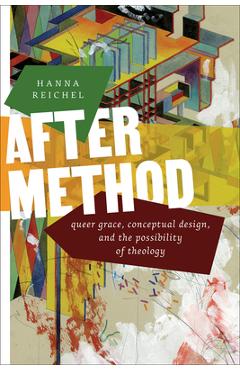After Method: Queer Grace, Conceptual Design, and the Possibility of Theology - Hanna Reichel

Detalii After Method: Queer Grace, Conceptual
After Method: Queer Grace, Conceptual - Disponibil la libris.ro
Pe YEO găsești After Method: Queer Grace, Conceptual de la Hanna Reichel, în categoria Religion.
Indiferent de nevoile tale, After Method: Queer Grace, Conceptual Design, and the Possibility of Theology - Hanna Reichel din categoria Religion îți poate aduce un echilibru perfect între calitate și preț, cu avantaje practice și moderne.
Preț: 223.2 Lei
Caracteristicile produsului After Method: Queer Grace, Conceptual
Comandă After Method: Queer Grace, Conceptual Online, Simplu și Rapid
Prin intermediul platformei YEO, poți comanda After Method: Queer Grace, Conceptual de la libris.ro rapid și în siguranță. Bucură-te de o experiență de cumpărături online optimizată și descoperă cele mai bune oferte actualizate constant.
Descriere magazin:
After Method assumes the impossibility of doing theology right-and moves beyond it. Organized as a conversation in two voices--with systematic-theological commitments represented by Karl Barth and constructive-theological commitments represented by Marcella Althaus-Reid--this book calls the redemptive potential of any methodological program into question. Indeed, the search for a full and complete theological account of reality has only further fragmented theological discourse. Thus, Hanna Reichel argues that method cannot save us--but that does not mean that we cannot do better. After Method harnesses the best insights systematic and constructive theologies have to offer in their mutual critique and gestures toward a better theology. Utilizing architectural metaphor, Reichel pulls from systematic and constructive approaches to develop an understanding of theological work as conceptual design, responsibly ordering and structuring given materials for a purpose. This necessitates a more realistic adaptation to reality for theology, expanding its standards to encompass the experiences and perceptions of people and speaking the truth available to it. The honesty, humility, and solidarity generated through the failure of method liberates theology to a more playful and tentative cruising of different approaches and redirects its attention to misfits and outsiders. Equally demanding and self-relativizing, the resultant ethos is better able to do justice to the reality of the world and the reality of God than doctrinal orthodoxy or methodological orthopraxy. After Method assumes the impossibility of doing theology right-and moves beyond it. Organized as a conversation in two voices-with systematic-theological commitments represented by Karl Barth and constructive-theological commitments represented by Marcella Althaus-Reid-this book calls the redemptive potential of any methodological program into question. Indeed, the search for a full and complete theological account of reality has only further fragmented theological discourse. Thus, Hanna Reichel argues that method cannot save us-but that does not mean that we cannot do better. After Method harnesses the best insights systematic and constructive theologies have to offer in their mutual critique and gestures toward a better theology. Utilizing architectural metaphor, Reichel pulls from systematic and constructive approaches to develop an understanding of theological work as conceptual design, r

Produse asemănătoare

After Method: Queer Grace, Conceptual Design, and the Possibility of Theology - Hanna Reichel
![]() libris.ro
libris.ro
Actualizat in 28/10/2025
223.2 Lei
Produse marca Hanna Reichel

After Method: Queer Grace, Conceptual Design, and the Possibility of Theology - Hanna Reichel
![]() libris.ro
libris.ro
Actualizat in 28/10/2025
223.2 Lei